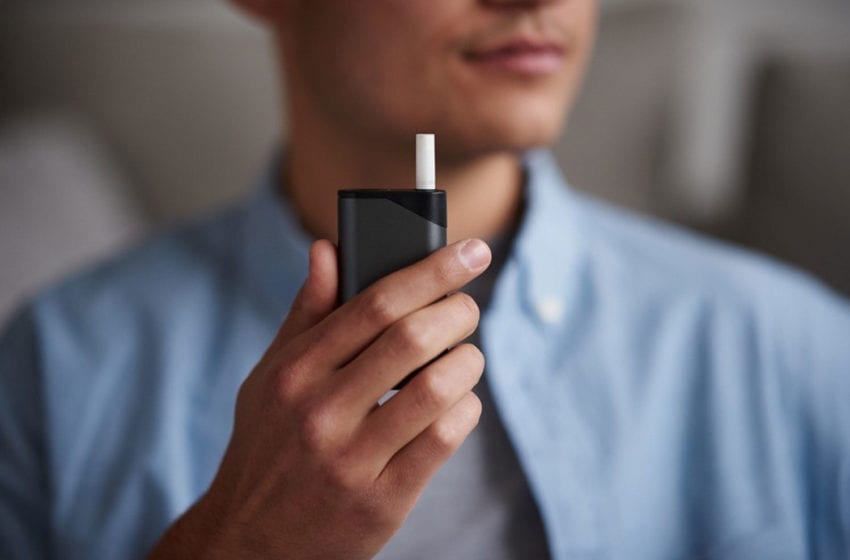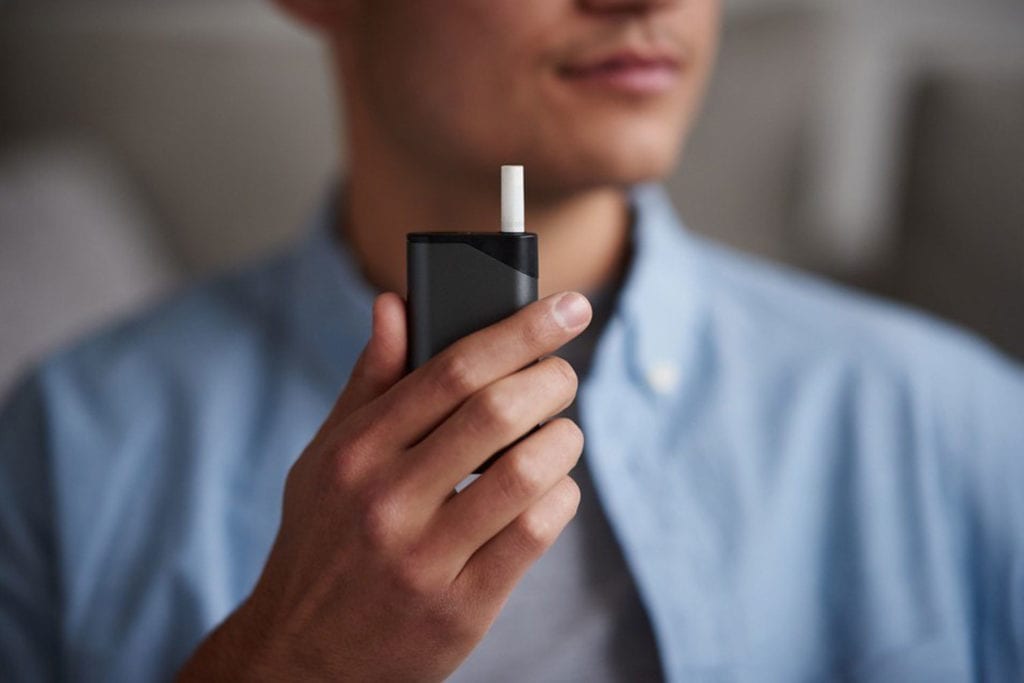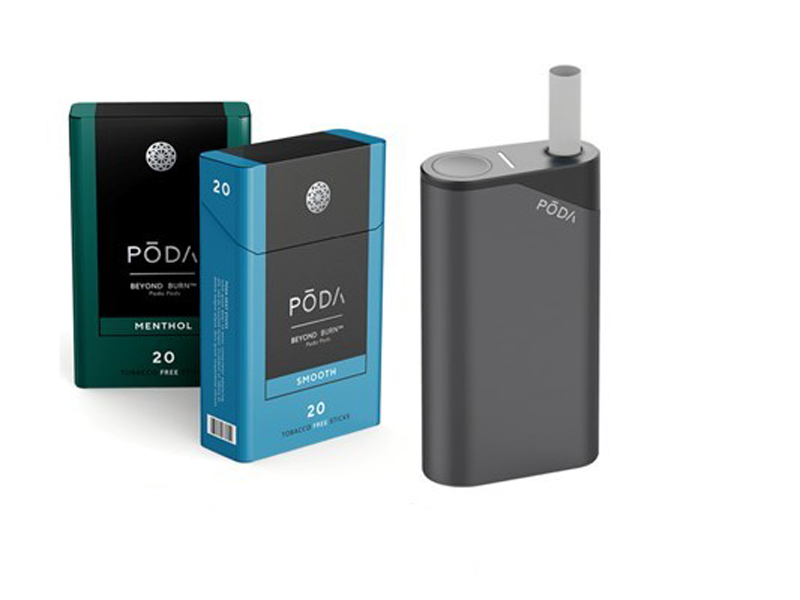Making its Mark
- Also in TR Heat-Not-Burn Print Edition
- January 1, 2022
- 0
- 0
- 11 minutes read


By addressing the shortcomings of existing products, Poda Holdings is pushing heat-not-burn technology to new levels.
By Marissa Dean
Sales of heat-not-burn (HnB) products have increased dramatically in recent years. In Japan—the world’s largest market for these products—HnB has helped drive down traditional cigarette consumption to unprecedented lows. Due to the absence of combustion, HnB devices release significantly lower levels of harmful toxicants than traditional cigarettes, allowing smokers to move down the risk continuum while continuing to derive the satisfaction they seek from nicotine.
Globally, the HnB market is dominated by large companies, such as Philip Morris International, BAT and Japan Tobacco International, along with regional players, such as KT&G. But smaller companies, too, are eager to make their mark. By addressing what they perceive to be the shortcomings of existing devices, they are slowly but surely claiming their share of this promising category.
Poda Holdings is one such company. The firm was founded in January 2015 with the goal of creating the best HnB product ever made, according to CEO Ryan Selby. “Many adult smokers have been seeking smoke-free products that have the potential to reduce the risks associated with their smoking habit,” he said. “By focusing on their wants and needs, we were able to identify some key components missing from the heat-not-burn industry.”
The company offers an HnB tobacco-free product called Beyond Burn. “Our flagship Beyond Burn Poda Pods contain a unique tobacco-free blend of pelletized tea leaves infused with synthetic nicotine, which have been expertly crafted to mimic the sensorial experience of traditional cigarettes without the smoke, without the smell and without the tobacco,” the company explains on its website. The tea leaves (versus tobacco or other substances) provide a stable, consistent and low-cost substrate that is truly tobacco-free for use in the device, according to Poda.

“The closed-ended design allows an incredibly wide variety of substances to be used in our system—something that open-ended systems simply cannot do.”
A New, Clean Technology
Poda’s current technology, which took six years to develop, consists of the Beyond Burn Poda Pods and the Beyond Burn heating device. The device features a single button with three temperature settings. It has a fast-charging battery that is capable of heating a full pack of pods on a single charge, and the company plans on launching additional devices across different price points in the future to allow consumers more choices.
“When we looked at the HnB space, it was clear that innovations were happening all around,” said Selby. “We knew that making a product that replicated the sensorial experience of smoking was only half the battle. Being well-versed in the space, we knew that odor and residue buildup in heating devices was a major user pain-point and one that no one had yet solved. In our research, this was one of the primary challenges users faced—a heating device that started out with excellent performance, only to degrade with use, gathering strong odors and requiring extensive cleaning to keep the device operational. This contamination also left flavor residue in the heating devices, limiting the options for switching different flavors and different types of substances. It was our goal to solve that problem as a primary focus, finding a way to keep all the mess contained within each disposable pod.”
The Beyond Burn Poda Pods are considered “zero-cleaning,” meaning that their pod design keeps any potential mess contained within the pod itself, taking away the need for cleaning or maintenance. This also means there is no residual odor in the heating device and no cross-contamination between pods when they are switched. “What sets us apart really boils down to our patented closed-ended pods,” said Selby. “The closed-ended design … allows an incredibly wide variety of substances to be used in our system—something that open-ended systems simply cannot do. Ground plant matter, pellets, sheets, liquids, etc., are all possible in our pods, where our open-ended competitors would have to come up with solutions for each of these material forms individually.”
“Big Tobacco was coming at the challenges in the space with answers that fit their existing manufacturing methods and techniques, and thus they weren’t thinking very far outside the box,” Selby said. “Poda came at the problem from a totally different angle.”
Pods are currently packaged in the company’s facility in China and are packaged in cartons of 200 pods, with each carton containing 10 packs of 20 pods. The current manufacturing capability is over 400,000 pods per month, but the company is currently scaling up production and plans to produce over 10 million pods per month by the end of 2021. “We’ve raised enough capital to scale up our production capabilities to meet initial launch demand, and we have a comfortable runway to execute our launch plans,” said Selby.

Regulation
The absence of tobacco in Poda’s products offers opportunities that are unavailable to tobacco-containing offerings. “The tobacco space is heavily regulated throughout the world, and new reduced-risk and heat-not-burn products face many of the same regulations as cigarettes as well as additional regulations pertaining to products in the vaporization space,” said Selby. “This overlap creates a complex regulatory landscape that is constantly evolving—each country having their own unique framework. Our first offering—our flagship Beyond Burn Poda Pods—contain no tobacco products whatsoever, so they tend to be outside the scope of existing tobacco regulations. As the landscape changes, our closed-ended pods will allow for exploring a multitude of different substance options for tobacco and beyond—allowing Poda to navigate regulatory hurdles in a way many of our competitors aren’t able to.”
While Poda Pods do not currently contain tobacco, the company has opted to file a premarket tobacco product application (PMTA) in the U.S. The PMTA pathway is a long process, with only a handful of applications approved to date, but it is necessary to market deemed tobacco products in the U.S. According to the Food and Drug Administration, deemed tobacco products consist of “electronic nicotine-delivery systems, which include e-cigarettes, e-cigars, e-hookah, vape pens, personal vaporizers and electronic pipes; pipe tobacco; dissolvables; nicotine gels; waterpipe (hookah); cigars; and future tobacco products.”
“We believe that our Beyond Burn Poda Pods are not subject to the PMTA as they contain lab-synthesized synthetic nicotine, no tobacco ingredients whatsoever and, importantly, cannot be used with any other tobacco products,” said Selby. “However, there are a multitude of potential future opportunities for Poda products to be used with tobacco, and so in order to demonstrate our commitment to total compliance with the PMTA, we have begun the PMTA process in the USA for Poda products containing tobacco and tobacco-derived products.”
Poda products contain synthetic nicotine, which is essentially chemically identical to tobacco-derived nicotine but currently outside of the FDA’s remit. Poda chose to use synthetic nicotine because it allows for more control over what goes into the pods. “Synthetic nicotine offers the same satisfaction as tobacco-derived nicotine without the chance of impurities and harmful substances from the tobacco plant contaminating it during the extraction process,” said Selby.
Beyond Burn Poda Pods are currently available in three different flavors with more expected down the line. The company is planning for other content offerings as well, including coffee/caffeine infused products, nicotine-free blends, real tobacco, cannabis/CBD and medicinal herbs. “We envision a family of devices, all designed to work with our pods, regardless of pod contents.”

Thinking Outside the Industry
To better reflect its broad, multisector ambitions, Poda recently announced a new planned corporate structure featuring six subsidiaries—Poda (Tobacco), Poda (Alternatives), Poda (Therapeutics), Poda (THC), Poda (CBD) and Poda (Research and Development). Poda has also filed intellectual property patents (already granted in Canada) for its proprietary technology, brought on new board members and created new positions. Former Juul Canada president, Michael Nederhoff, joined the global advisory board and is consultant to Poda’s management team and the company’s board, assisting with the company’s global expansion. Nicholas Kadysh, former Juul head of corporate affairs, recently joined Poda’s global advisory board as well.
Poda is also thinking beyond consumer goods, entering the medical device market and appointing the company’s first chief medical officer, Jagdeep Gupta. “I am very pleased to have received approval from the board to enter the medical device market and to create the position of chief medical officer for Poda,” wrote Selby in a press release. “In addition to providing exceptional reduced-risk products designed for current adult smokers, Poda is also committed to providing effective smoking cessation products designed to help adult smokers quit smoking.”
“Quitting smoking can be difficult, and the addition of Dr. Gupta as chief medical officer will help Poda to develop medically approved products and treatment strategies designed to provide adult smokers with the tools they need to successfully quit smoking. In addition, there are numerous opportunities for Poda to utilize our intellectual property and related technologies to potentially facilitate the delivery of many different therapeutic molecules by inhalation.”
Gupta later announced that he began clinical trials for Poda’s smoking cessation products. “I have already initiated the process of setting up the first clinical trials related to the efficacy of Poda’s products as smoking cessation tools,” Gupta wrote in a release. “I am currently in the process of setting up a pilot study, which will give us a solid platform for developing strong and effective clinical trials. These clinical trials will be designed to result in the publication of Level 1 evidence in respected medical journals globally if the data provides evidence. The pilot studies will also be designed to establish a scientific basis for the efficacy of Poda’s products as smoking cessation tools and additionally may provide Poda with access to research grants and other funds that can be used for additional studies, clinical trials and validation research.”
In addition to expanding into the medical device industry, Poda signed a supply agreement with Greenbutts, a biodegradable filter manufacturer. “This supply agreement will provide the company with access to 100 percent biodegradable filters for use in our Beyond Burn Poda Pods,” according to Selby. “The inclusion of Greenbutts’ biodegradable filters into our already biodegradable and compostable Poda Pods allows Poda the ability to offer a completely biodegradable and truly compostable heat-not-burn product, something that has never been done in the heat-not-burn tobacco market.”
Gamechanger
Poda has accomplished a lot in the past six years and is now poised to be a potential gamechanger in the heat-not-burn market. A mess-free, zero-cleaning biodegradable product that could reach beyond tobacco and nicotine products seems like it would be a very attractive product for consumers—and it would seem others agree; Poda recently received an order for 500,000 Beyond Burn Poda Pods and 2,000 Beyond Burn Heating Devices, expected to be used during the initial launch in the European market later this year.
Time will tell how this technology impacts the market. Selby, for his part, is confident Poda could change the face of HnB. “I believe that Poda really is the solution the HnB space has been waiting for,” he said.

